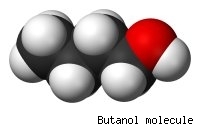Have you heard about butanol recently? Yes, it's one of those alternative fuels around which doesn't seem to be so fashionable these days (especially if you compare it to its smaller, at least in carbon atoms per molecule, sibling ethanol) but it seems that it might light up our interest again.
EnergyQuest is announcing plans to start producing butanol while producing hydrogen and electricity at the same time. This announced method uses waste from both feed stocks (like wood waste, trash, cow manure) and lignite coal (the latter being the most predominant one) and creates butanol using a gasification and catalytic conversion process that is claimed to minimse impact on the environment. Current butanol manufacturing procedures are based on fermentation and are more energy-intensive.
This new method, called PyStr (TM) produces butanol synthetically by gasifying any carbon sources to syngas (which in simpler terms is a mix of hydrogen + CO and CO2 gas). This gas is then introduced to a converter where the catalyst process yields liquid butanol.
Related:
[Source: Energy Quest]
 What is butanol?
What is butanol?
The Wikipedia gives us a very accurate definition: Butanol or butyl alcohol (sometimes also called biobutanol when produced biologically), is a primary alcohol with a 4 carbon structure and the molecular formula of C4H10O. It is primarily used as a solvent, as an intermediate in chemical synthesis, and as a fuel. EnergyQuest's method announces it made from both biological sources and stock coal.
The claimed benefits of butanol as fuel are:
- Energy density only 10% below gasoline.
- Octane rating 25% higher than gasoline.
- Doesn't eat away at plastic or rubber engine parts (like ethanol/methanol).
- Can be pumped/stored/transported in same equipment as gasoline.
- Any percentage gas + butanol (10 to 100%) will run in today's cars, no modifications are required unlike ethanol fuelled cars.
- Butanol does not absorb water like ethanol or methanol (long-term storage=no problem).
- Butanol burns cleaner than gasoline (no NOx, SOx or Carbon monoxide)
And, according to Wikipedia the shortcomings might be:
-
A certain adjustment has to be made in the engines to increase fuel-flow
-
Still some fuel system components can be attacked by butanol.
-
It might cause erroneous gas gauge readings with capacitance fuel gauging.
-
Viscosity is higher - it can affect the fuel system.


Sign in to post
Please sign in to leave a comment.
Continue